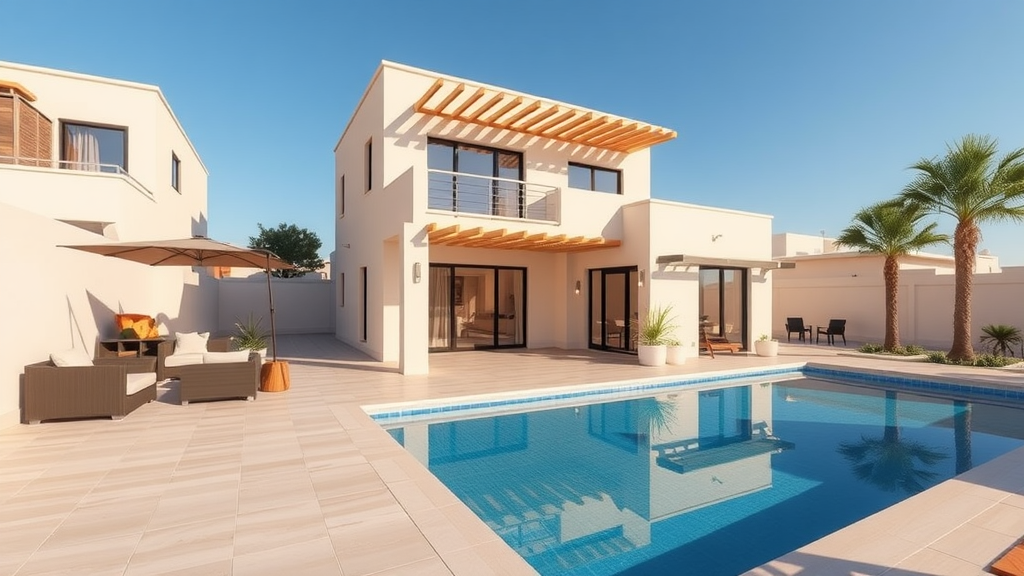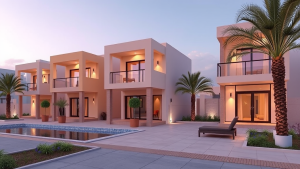The role of vision 2030 in shaping sustainable apartment developments in Hurghada
Vision 2030 serves as a transformative blueprint for sustainable development not only in Egypt but specifically in Hurghada. This vibrant coastal city is evolving thanks to initiatives that prioritize environmentally responsible building practices and community growth. As urban areas expand, the focus on sustainable apartment developments becomes more critical to ensure that growth does not come at the expense of environmental quality.
Sustainable apartment developments in Hurghada are being driven by several key elements under the Vision 2030 framework:
- Environmental Protection: The emphasis on protecting natural resources is essential. Developers are now required to implement eco-friendly construction practices, utilizing sustainable materials and energy-efficient technologies. This helps in preserving Hurghada’s beautiful coastlines and marine ecosystems.
- Energy Efficiency: Vision 2030 encourages the use of renewable energy sources. Solar panels and wind turbines are becoming commonplace in new apartment complexes, reducing reliance on traditional energy sources. These advancements not only lower energy costs for residents but also decrease the carbon footprint of the buildings.
- Water Conservation: Water scarcity is a significant issue in many parts of Egypt, including Hurghada. Apartment developments are now integrating advanced water-saving technologies. For instance, rainwater harvesting systems and greywater recycling are implemented to ensure that water resources are conserved.
- Community Engagement: Building sustainable apartment developments involves cultivating a sense of community. Developers are focusing on designs that promote social interaction, such as communal gardens, shared recreational spaces, and walking paths. This engagement fosters a stronger sense of belonging among residents.
- Smart Technology: smart home technologies in new apartments enhances sustainability efforts. From energy management systems to smart thermostats, these technologies help residents monitor and reduce their energy consumption, leading to more sustainable living patterns.
Vision 2030 also emphasizes the importance of regulatory frameworks that support sustainable development. By enforcing building codes that prioritize green construction practices, the Egyptian government encourages developers to adopt sustainable methods. These regulations may include requirements for using a certain percentage of recycled materials or obtaining specific certifications for energy efficiency.
The role of public awareness in realizing Vision 2030’s goals cannot be understated. Educating the public about sustainable living is vital for fostering a culture of environmental responsibility. Local communities in Hurghada are participating in workshops, seminars, and information campaigns designed to inform residents about the benefits of living in eco-friendly apartment complexes. As more people demand sustainable options, developers are more likely to respond to this market need.
Investing in sustainable apartment developments also brings economic benefits. Opportunities for job creation arise as new projects begin construction, and the tourism sector can thrive as eco-conscious travelers increasingly seek out environmentally friendly accommodations. Additionally, well-planned developments can enhance property values, benefiting homeowners and investors alike.
Over time, as more sustainable apartment buildings emerge in Hurghada, the overall quality of life for residents is expected to improve. These communities will not only offer a comfortable living experience but also a healthier environment, aligning perfectly with the aspirations of Vision 2030.
With such a clear commitment to sustainability, Hurghada is setting an example for coastal cities worldwide. As developers align their projects with the goals of Vision 2030, the city can continue to grow while preserving its natural beauty and ensuring a high quality of life for its residents. By embracing these principles, Hurghada is creating an urban landscape that blends modern living with environmental stewardship, proving that sustainability and development can indeed go hand in hand.
Ultimately, the successful implementation of Vision 2030 in Hurghada will rely on collaboration among government agencies, developers, and the community. Bringing together different stakeholders under a unified vision can lead to innovative solutions and designs that not only meet the needs of today but also pave the way for a sustainable future.
The impact of sustainable living on the future of urban development in coastal areas
The emphasis on sustainable living is transforming the way coastal urban areas are being developed. As populations grow and environmental challenges intensify, the concept of sustainable development stands at the forefront, ensuring that the needs of both people and nature are met. Adopting sustainable practices in urban planning not only enhances the quality of life for residents but also preserves the delicate coastal ecosystems.
With the rise of innovative technologies and environmentally friendly practices, cities along coastlines can look forward to a future where urban development aligns closely with sustainability principles. Here are some key ways that sustainable living is impacting urban development in these regions:
- Energy Efficiency: Coastal urban areas are increasingly focusing on energy-efficient buildings that maximize natural light and utilize renewable energy sources. Solar panels and wind turbines are becoming standard features in new developments, significantly reducing the carbon footprint of residential buildings.
- Green Spaces: The integration of parks and green roofs in urban designs contributes to biodiversity and improves air quality. Coastal cities are creating spaces that not only serve recreational purposes but also act as buffers against storms and flooding.
- Waste Management: Effective waste management systems are critical. Many coastal developments are now adopting zero-waste policies that promote recycling, composting, and the reduction of single-use plastics, ensuring that urban areas remain clean and environmentally friendly.
- Water Conservation: Sustainable living encourages the implementation of efficient water management practices. Rainwater harvesting and greywater recycling systems are essential in coastal developments, helping to mitigate water shortages and protect marine ecosystems.
- Transportation Solutions: Walkable neighborhoods and accessible public transportation options reduce car dependency, thereby lowering emissions. Coastal cities are investing in bike lanes, pedestrian pathways, and electric vehicle charging stations.
- Resilient Infrastructure: Urban developments are now designed with resilience in mind. Buildings are constructed to withstand extreme weather events, while sea walls and natural barriers help protect against rising sea levels and coastal erosion.
Community engagement plays a vital role in promoting sustainable living. Residents are increasingly involved in the planning process, allowing for developments that reflect their values and needs. Educational programs raise awareness about sustainability, encouraging a culture of responsibility towards the environment. This collective effort fosters a sense of belonging and stewardship within the community.
In addition to community input, governmental policies are integral to promoting sustainable urban development. Coastal cities are benefiting from incentives for developers who prioritize sustainable practices. These policies encourage the construction of eco-friendly buildings and the use of sustainable materials. Moreover, zoning regulations are evolving to support mixed-use developments, which integrate living, working, and recreational spaces to reduce travel time and energy consumption.
Technological advancements are also accelerating the shift towards sustainable living. Smart city technology is being utilized to monitor energy usage, manage waste, and control water consumption, thereby optimizing resource management. Coastal urban areas are implementing smart grids and IoT devices that allow residents to track and reduce their environmental impact in real-time.
Importantly, the focus on sustainability can enhance the economic viability of coastal urban areas. As more people become environmentally conscious, property values in sustainable developments are on the rise. Additionally, businesses that prioritize sustainability attract eco-conscious consumers, further driving economic growth.
As we consider the future of urban development in coastal regions, the importance of planning with sustainability in mind cannot be overstated. The long-term benefits of adopting sustainable living practices not only ensure the preservation of the unique coastal environment but also provide a high quality of life for current and future generations. By embracing sustainability now, coastal urban areas can create vibrant, resilient, and thriving communities for years to come.
Vision 2030 is more than just a framework; it serves as a catalyst for transforming Hurghada into a model of sustainable living. By prioritizing eco-friendly designs and energy-efficient technologies in apartment developments, the initiative not only enhances the quality of life for residents but also preserves the stunning coastal environment for future generations. Sustainable living in Hurghada positions the city as a leader in responsible urban planning, driving innovation and encouraging local businesses to adopt sustainable practices.
As communities become more aware of their environmental footprints, the shift towards sustainable apartment developments reinforces the importance of balancing habitation with nature. Urban development in coastal areas, like Hurghada, can significantly benefit from these green practices, as they protect natural resources while fostering economic growth. This approach ensures that new projects contribute positively to the community, such as creating green spaces and promoting local ecosystems.
The commitment outlined in Vision 2030 is not only about immediate benefits. It sets the groundwork for future advancements in urban development, helping other regions learn from Hurghada’s success. As more residents and developers embrace these sustainable practices, the vision portrays a promising picture of urban living—one where human activity harmoniously coexists with nature, ensuring that coastal communities thrive without compromising their beautiful landscapes. The future of Hurghada and similar coastal cities rest in their ability to adopt this progressive vision, paving the way for sustainable growth that benefits both people and the planet.
15% off – 2 bedroom twin house for sale with swimming pool in Magawish Hurghada under 125k — spacious homes for belgian couples
Last offer – affordable 3 bedroom town house for sale in almamsha promenade Hurghada under 150k — sea view homes for russian investors












